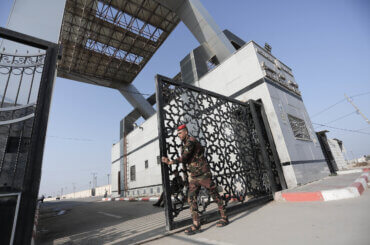
‘The English Patient’ Why didnt Egyptians like this Egypt?
In Europe and America, the understanding of the last 150 years of Egyptian history is still based largely on the romanticized British imperial view. The film The English Patient was only the most recent of the established cultural genre, which shows efficient but kindly British officials, benign guides rather than colonial masters, presiding over a cosmopolitan European elite in Cairo and Alexandria, protecting the Middle East from the Turks in the First World War and from Rommel’s German army in the Second. In the background, native Egyptians in exotic clothing serve tea as fans whirl overhead, or haggle heatedly but humorously in the bazaar. Meanwhile, out along the Nile, peasants cultivate their plots just as their predecessors had for the past five millennia, back when their ancestors built the great Pyramids.
This complacent fiction is indispensable to the continuing practice of Orientalism. Why did Egyptians have to rebel against such a pleasant and orderly world? They must be suffering from something called “Muslim rage,” irrational wounded pride, jealousy, pathetic self-pity.
To learn some genuine history, let’s start with the construction of the Suez Canal. People in the West know only that a French engineer named Ferdinand de Lesseps designed the waterway, and that Verdi wrote the opera Aida to celebrate its opening in 1869. In fact, Egyptian peasants were drafted to work on the canal, without pay. Some 30,000 were digging at any one time, and during the 10-year project 1.5 million people altogether did forced labor. Thousands of Egyptians died to finish it.
Egypt’s unequal and exploitative integration into the modern world economy had started even before the Suez Canal was built. Joel Beinin, whose excellent Workers and Peasants in the Modern Middle East tells part of the story, explains how the Ottoman ruler, the Albanian Mohammed Ali, had already imposed the cultivation of long-staple cotton in 1821, forcing nearly 500,000 Egyptian peasants every year to work for nothing to build the expanded irrigation works that the new product required. When the American Civil War cut off U.S. cotton exports from 1861-65, Egyptian cotton boomed on the world market, and the new class of big, wealthy landlords emerged. As Beinin says, “Much of the Nile Delta was transformed into a vast plantation.”
By now, Muhammad Ali’s successors were heavily in debt to Europe, so Britain was able to seize de facto control of Egypt. It never became a formal colony, but British troops were stationed there and arrogant British and European officials ran both the country and the Suez Canal. In fact, Ismailiya, the Canal Corporation’s headquarters, had become such a stratified company town that indignant Egyptians founded the Muslim Brotherhood there in 1928; the Brotherhood was as much a political, anti-colonial movement as a religious revivalist organization.
In the Western imagination, Cairo in World War I was a city at peace, a place where Lawrence of Arabia came to rest and plan his next campaign against the Turks. Max Rodenbeck’s remarkable Cairo: The City Victorious has a different view: “The poor suffered – starved even – as food shortages doubled wartime prices. The British . . . commandeered 20,000 peasants into work battalions, where a quarter perished from disease.”
Not much changed by World War II, either, even though the cotton boom had financed spectacular Belle Epoch European districts in Cairo and Alexandria (one such structure is immortalized in Alaa Al Aswany’s great 2002 novel, The Yacoubian Building). Rodenbeck explains that in the 1940s half of Cairo’s children died before the age of five, and that “away from the spacious streets and grand villas of the new quarters, the vast majority of Cairenes made do without running water or electricity.”
If you lived in the West in the 1950s and 60s, you were regularly instructed that Gamal Abdel Nasser and the other Free Officers who seized power in Egypt in 1952 – the first native Egyptians to rule their country in two thousand years – were mercurial, irrational and unbalanced. The Free Officers launched a genuine land reform to improve the hard lives of the Egyptian peasants, but the Western press instead explained Nasser’s great popularity as a kind of mass madness.
When Egypt nationalized the Suez Canal in 1956 – a perfectly legal move, and Egypt offered compensation – the British prime minister, Anthony Eden, compared Nasser to Hitler. Eden told another British official, “What’s all this nonsense about isolating Nasser or ‘neutralising’ him as you call it. I want him destroyed, can’t you understand? I want him murdered, and if you and the Foreign Office don’t agree, then you’d better come to the Cabinet and explain why.”



OT, another murdered iranian scientist.
http://www.bbc.co.uk/news/world-middle-east-16501566
A university lecturer and nuclear scientist has been killed in a car explosion in north Tehran.
Mostafa Ahmadi-Roshan, an academic who also worked at the Natanz uranium enrichment facility, and the driver of the car were killed in the attack.
The blast happened after a motorcyclist stuck an apparent bomb to the car.
Several Iranian nuclear scientists have been assassinated in recent years, with Iran blaming Israel and the US. Both countries deny the accusations.
also reported as joint mossad/MEK (as in the terrorist group) operation:
http://www.richardsilverstein.com/tikun_olam/2012/01/10/iran-blames-israel-for-assassinating-another-iranian-nuclear-scientist/
There is no end to western perfidy, especially that of the press. Look at the press’s ignoring or trashing of Ron Paul, echoing that of Jesse Jackson, back in his day. The press/media do not want to tell the true story but to earn the continuing praises of the big-shots, whoever they may from time-to-time be. Or to instill and promote an unwarranted sense of racial or civilizational superiority in the public.
As far a developing nations go, Egypt and South Korea were on par in the early 1950’s. Why has South Korea succeeded and why has Egypt failed to develop?
“We live entangled in webs of endless deceit, often self-deceit, but with a little honest effort, it is possible to extricate ourselves from them. If we do, we will see a world that is rather different from the one presented to us by a remarkably effective ideological system, a world that is much uglier, often horrifying.” (Noam Chomsky)
The top image at the arabist http://www.arabist.net shows a scene in Cairo and it is from a rather anglophile belgian comic from around 1950. The atmosphere in Egypt is quite colonial. The protagonist is also accompanied by a trusty indian servant.
The book probably was my first encounter with Egypt as a kid.
This one: http://www.amazon.com/Mystery-Great-Pyramid-Part-Adventures/dp/1905460376